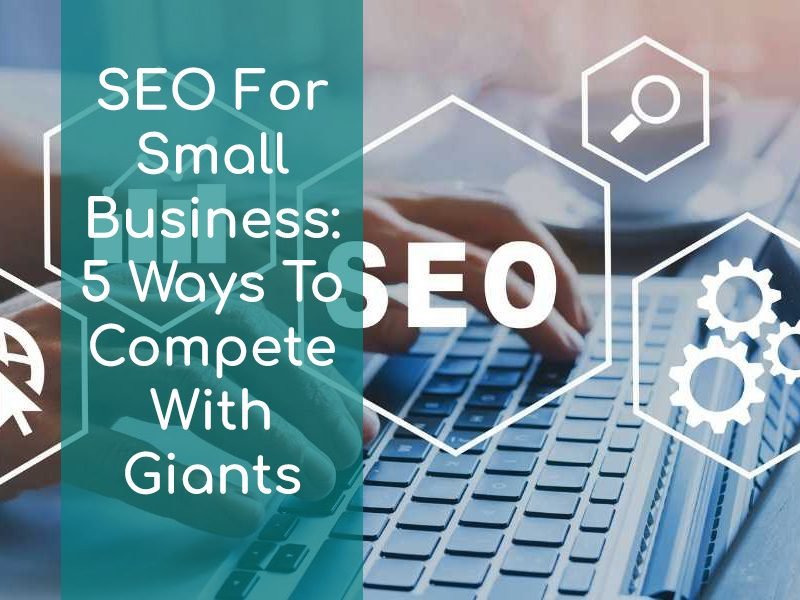Here’s a look at how can your small business can possibly compete against brands, major media companies, and other big players in Google search results.
One of the fundamental advantages of internet marketing – and SEO specifically – is that it can empower businesses of all sizes to compete more effectively, lowering the impact of budget differentials.
Small to medium-sized businesses (SMBs) or enterprises should aim to gain ground on larger competitors in the same digital space and maximize the opportunities of being a smaller entity online.
In this post, take a practical look at SEO for small businesses and 5 ways an SMB can punch above their weight.
1. Become The Expert Voice In Your Niche
As an SMB, you have an ideal chance to position your expertise at the forefront of your business through yourself and other key staff.
Within the online community, you are able to provide a credible, trusted, and real-world face to an often colder perceived online approach of many bigger brands.
Smaller entities are frequently seen as already being closer to their audience, so when SMBs are able to pivot, identify, nurture and share their offline ways of operating online, the rewards can be vast.
There are a few advantages that an SMB has over a larger company, such as:
- Less red tape and internal barriers to get access to the conversation sooner.
- Established people-orientated ways of working are often required for smaller brands to function.
- Genuine experience offline inside the community can be adapted for online gains.
- Real opinion and opportunities for open commentary sharing.
- Agility to adapt approaches and take increased risks with data-supported trial and error.
It is incredibly challenging for larger entities to have an authentic voice within the online community, and this provides a fantastic route to market for SMBs.
2. Do The Basics Well
We appreciate that ‘basics‘ can have numerous connotations. However, for small business SEO, always keep the focus on the fundamentals for success.
Your time, resource, and budget may place limitations on experimentation, so ensure you place emphasis on the known factors that impact SEO and your website visitor successes.
Do not get lost on vanity metrics or measurements of success that prevent you from investing those gains into more SEO and digital marketing.
There are many basics to prioritize, and they will differ depending on your starting point for SEO, but keep it simple and consider:
- Access to key content: How easily can people find, digest and convert from your content cornerstones?
- User Experience: How fast does your content load and are there any unnecessary distractions preventing the user from moving forward?
- Technical barriers: Do you make it easy for search engines to understand, index, and rank your content?
- Page understanding: How can you reinforce the topic of the content and strengthen the signals you are sending to search engines based on headings, URLs, internal links, and other signals on the page?
- Content hierarchy: When you look at your website navigation and supporting content access elements (sub-navigation, footer, etc.), how intuitively and easily can someone get to your most important pages?
- Mixed content types: Do you make it easy for your content to rank for all types of relevant search results (images, video, and others)?
- Comprehensive content coverage: Can somebody have a thorough and complete understanding of a topic without leaving your page? Are there better examples of content available that logically should perform better than yours?
- The local advantage: Can you leverage your location to enhance your claim to SEO success greater than other national, regional, or global brands?
3. Authority Building With Credible Content Creation
Smaller businesses tend to have a thorough understanding of their audience. When this is combined with SEO and an evidence-led mindset for content building, it can support substantial marketing benefits.
The creation of high-performance digital content doesn’t have to be fully reliant on the business, or only available through outsourcing to an agency.
Often there are combinations of both to explore to provide maximum capturing of the moment without overstretching resources or budget but making the most out of both.
Once you have committed to a content plan, you will want to focus on the value to your audience versus the commercial value to your business, and adjust the course as you go, to get this balance right.
Typically credible authoritative content will have:
- Inherent and tangible merit to the audience.
- Standalone purpose and increased usefulness above competing examples.
- Opinion, data, and unique insight closely matching your expertise and niche.
- PR and media value; especially for local publications.
- Strong trusted authorship within the content ideation and creation.
- Layers of impact for multiple persona types.
- Mixed content repurposing to target various user preferences.
- Easy to access, digest, and well-promoted messaging.
To begin with, we’d suggest your first key content items are created based on the areas you are best known for within your business niche.
Consider the factors that require your company service or offering the most, and why people will come to you versus the competition.
From here, you can make use of this meaningful differentiation and impart many of your lessons and advice into a truly valuable content asset that can repeatedly work hard for your link and authority-building exercises.
Great content requires expertise, energy, plus ongoing effort to generate the optimum potential from it.
4. Leverage Local Optimization
To punch above your weight in SEO, you need to get every ounce of value from the time you invest online.
Local optimization for SMBs will always offer a chance to increase your return on investment.
The reason behind this is that you have a legitimate claim to your local community, and in many cases, a more genuine claim to this visibility than other competing sites, regardless of scale.
You will not likely find an SEO post for SMBs which does not factor in local SEO, and that’s because it works.
There are core activities you can take to make progress on local SEO for small businesses. These include:
- Claiming, maintaining, and sharing updates on your Google Business Profile (formerly Google My Business).
- Creating location landing destinations on your website, rich with local content.
- Seeding into your services (where applicable) local updates and associated information.
- Being active with local media and publications.
- Running location-based marketing programs and incentive schemes.
- Generating local reviews, testimonials, and case studies.
- Actively be present in community websites, forums, plus question and answer sources.
- Sharing your expertise and opinion on main social media channels.
- Using LocalBusiness schema where relevant.
5. Become The Problem Solver
One thing that is ever-present in all industries is the need for people to have their questions answered, plus their pain points addressed.
Prioritizing problem-solving is a common tactic that helps bring the business in front of their audience online at periods when they are needed the most,
As a monthly (ideally weekly) exercise, take a delve into your Google Search Console data and find all the terms that include; who, what, why, where, when, how.
Then consider related pain point queries such and phrases including; issue, problem, and more.
You can then add to this location triggers, cost/price, and other areas such as evaluation and comparison type terms.
You will likely discover many new terms and topic areas your audience is seeking advice and opportunities to position yourself and your SMB at the forefront of answering them.
This type of value-based support and audience-aware content creation can provide layers of value and business impact online.
Lots of the rich content you create with this approach will have layers of potential.
For example:
- You can create a community hub to house FAQ content.
- From this hub, you can build destinations or content that has a broader appeal to your audience and delivers traffic and conversions to your site.
- You can promote and share this content socially and on external sites in snippets, to help solve repeat audience questions, and drive fresh links to your content.
- The content can be repurposed in other content types such as video and image content, enabling ranking and SEO gains in new search verticals.
- As visibility grows you will attract many new and unanswered queries that fuel the cycle above.
- You can always add to the queries by completing competitor content gap analysis in their question and answer visibility, and by using free tools such as Answerthepublic.
Summary
Smaller companies have a great opportunity to outpunch their perceived weight online.
By focusing on the 5 key areas discussed in this post and following up with the suggested tactics supporting these, you will be able to grow your small or medium business SEO success in a meaningful and value-based way.





